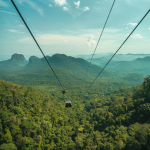In a classic showdown between progress and preservation, the Seub Nakhasathien Foundation has thrown down the gauntlet against a proposed cable car project set to weave its way through the heart of Phu Kradueng National Park in Thailand’s Loei province. The foundation, a steadfast custodian of the country’s natural treasures, has sworn to protect Phu Kradueng’s awe-inspiring landscapes from the perceived ill-effects of the cable car system—believing it could rival a fairytale gone wrong if left unchecked.
The foundation’s ruffling of feathers comes hot on the heels of a move by the Department of National Parks, Wildlife and Plant Conservation (DNP) that sanctioned a two-year grace period for expanding feasibility studies and conducting an in-depth environmental impact assessment (EIA). The Designated Areas for Sustainable Tourism Administration (Dasta) has been handed the blueprint duty, complete with a princely budget of 25.7 million baht just for the supporting studies.
Not one to back down, DNP director-general Atthapol Charoenchansa recently lent his voice to the plan—the envisioned 3-kilometer cable car voyage being one of the costliest adventures on record. Clocking in at a projected billion baht for phase one alone, with watchful eyes already on a second phase promising further development, the stakes couldn’t be higher.
As if this aerial adventure weren’t enough, talk of electric buggies zipping through the park has ignited further debates. It’s a plan that, while embryonic in form, sets conservationists on edge, hinting at an influx of infrastructure and the potential domino effect that new tourist conveniences tend to trigger.
Beneath the bold proclamations lay poignant questions from the foundation about the cable car’s alleged economic boon. While more visitors could equal more baht in the vicinity’s coffers, it begs the question if the DNP, with an increased tourist tide, can hold the proverbial line and preserve the fragile balance of Phu Kradueng’s ecosystem.
Phu Kradueng is not just another pretty face in the crowd. The park holds a revered status, being Thailand’s second official national park and proudly wearing the Asean Heritage Park badge since 2023. Drenched in vibrant green with over 98% swathed in natural forest, it cradles rare flora and gives sanctuary to a menagerie of endangered celebrities, from the elusive serows and Javan pangolins to the charming dusky leaf monkeys and white-handed gibbons.
The Seub Nakhasathien Foundation has not minced its words: any project that doesn’t court ecological integrity like a suitor gone above and beyond risks devaluing Phu Kradueng’s conservation cachet. Long-term degradation could not only tar the park’s pristine reputation but might even force an administrative reshuffling under the guise of development.
In the tug-of-war between advancement and the age-old wisdom of conservation, it’s clear that the next steps taken will either cement Phu Kradueng’s legendary status or cast it as a cautionary tale for the ages.


















This cable car project is an absolute travesty! It will ruin Phu Kradueng’s natural beauty and disrupt the local wildlife.
But think of the economic benefits! More visitors mean more jobs and income for the local communities.
No economic benefit is worth destroying such a unique ecosystem. We need to find sustainable ways to support these communities.
I completely agree with you! We should prioritize conservation over commercial gains any day.
As a tourism enthusiast, I think the cable car could make visiting the park accessible for everyone, including people with disabilities.
Accessibility is important, but not at the cost of environmental degradation. Let’s explore eco-friendly alternatives instead.
I see your point. Maybe electric buggies could be a better compromise if planned sustainably.
Can someone explain why the foundation is heavily against the project? I heard it’s supposed to be beneficial.
The foundation fears that increased tourism and infrastructure could harm wildlife and natural landscapes irreparably.
That makes sense, but isn’t there a way to balance both development and conservation?
Finding a balance is tricky. EIA and strict regulations should be enforced, but even those aren’t foolproof.
Exactly, and once the damage is done, it’s often irreversible. Prevention is better than cure.
We keep talking about preserving nature, but is the foundation just against development entirely?
I believe the foundation supports sustainable development that doesn’t compromise ecological integrity.
Suppose they go ahead with the cable car; would local guidelines even ensure proper enforcement?
That’s a good point. Enforcement of guidelines is often weak, and bureaucratic hurdles can delay action.
Then, what are the safeguards for preventing this from turning into another poorly regulated development?
The risk of habitat disruption is real, not to mention the impact of noise and pollution from construction activities.
Agreed, but perhaps they could use eco-friendly construction techniques to minimize impact.
Eco-friendly techniques are promising! We need to make sure they are properly implemented.
Wow! Situations like these showcase the classic conflict between progress and preservation.
History will judge our decisions. It’s important to ensure that tourists don’t become the overseers of natural sites.
Our responsibility as custodians of nature is paramount. Lessons from history show us the risks of unchecked expansion.
What’s the point of a natural park if it’s covered in roads and buildings?
There’s a thin line between a playground and a preserve. We must tread carefully.
Exactly my point! Once lost, natural places can rarely be fully restored.